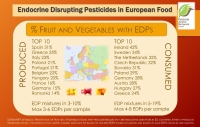One-third of European fruit contains 27 potentially harmful endocrine disrupting pesticides (EDPs), reported in scientific literature to cause endocrine disruption in animals and probably in humans.
This is the shocking result of Pesticide Action Network Europe’s latest analysis, which took into account 2015 monitoring data of fruit and vegetables from all EU Member States, following a public access to documents request. Mandarins, oranges, grapes, and peaches are all on the top of the list, turning a healthy fruit salad into a potentially toxic cocktail.
Pesticide Action Network Europe calls upon MEPs to reject the European Commission’s “unfit” proposal to protect people against harmful EDPs – due for voting tomorrow.
One third of our fruit is contaminated with EDPs:
The analysis, based on official 2015 food monitoring data on pesticide residues in EU Member States, reveals that one third of fruit consumed in Europe was found containing EDPs (34%), with citrus fruit, rich in vitamin C, on the top of the list; about half (46-57%) of mandarins, oranges and grapefruit had EDPs residues. A smaller but still important amount (17-40%) of popular vegetables (rocket, lettuce and tomatoes) also were found to contain EDPs, and several fruit and vegetables contained not just one pesticide, but an actual cocktail (up to 8 EDPs per sample) whose collective toxic potential effects are not assessed.
All countries are affected:
A high number of fruit and vegetables produced in Southern countries such as Spain, Italy and Greece contain EDPs, while it’s mostly the fruit and vegetables sold in markets of Northern countries like Ireland, Sweden and The Netherlands that contain EDPs. It appears that no country remains unaffected.
Most EDPs detected are KNOWN to cause serious endocrine-related adverse effects:
Worryingly, the pesticides detected most frequently have been reported in scientific literature to cause serious endocrine-related adverse effects, that are relevant for humans[1]. Chlorpyrifos for example, which acts on the nervous system of insects, is at the top of the list and has been reported to cause neurodevelopmental (brain) toxicity in humans, affecting infants and children[2].
Environmental Toxicologist, Angeliki Lysimachou adds “A matter of such importance involving our food and affecting the most vulnerable demands immediate action, and if EU regulators fail to protect us then it’s down to Member States to take action. These chemicals have no place neither on our table, nor in the production of our food”.
Call upon MEPs to reject the European Commission’s “unfit” proposal:
The report comes just one day before the Members of the European Parliament are called to decide whether they will reject or not the European Commission’s highly controversial criteria to identify pesticides that are endocrine disruptors as required by the pesticide regulation (1107/2009)[3]. The criteria have been characterised as scientifically “unfit” to protect people from the potential harms caused by EDCs[4] and even as illegal, since the Commission went beyond its legislative power[5].
PAN Europe’s report highlights that residues of endocrine disrupting pesticides (EDPs) are not regulated adequately in Europe as they are detected in our daily fruit and vegetables, and may be putting the European population at risk, in particular the most vulnerable, namely pregnant women, unborn and new-born babies. Their efficient regulation is urgent.
Summaries of France, Germany, the Netherlands and Belgium can be sent upon request.
Contact: Angeliki Lysimachou +32 2 318 62 55 angeliki [at] pan-europe.info
[1] PAN Europe, 2015. Impact Assessment of the Criteria for Endocrine Disrupting Pesticides. https://goo.gl/52beuW
[2] Burke RD et al., 2017. Developmental neurotoxicity of the organophosphorus insecticide chlorpyrifos: from clinical findings to preclinical models and potential mechanisms. J Neurochem., 142:162-177
[3] PAN Europe’s briefing on EDC criteria https://goo.gl/yW6Crz
[4] Press Release, Endocrine Society, June 16th 2017. Endocrine experts united in disappointment with European Commission's proposed criteria on EDCs
[5] Center for International Environmental Law (CIEL), 2017. ED Criteria legal opinion. https://goo.gl/EdRvPZ
